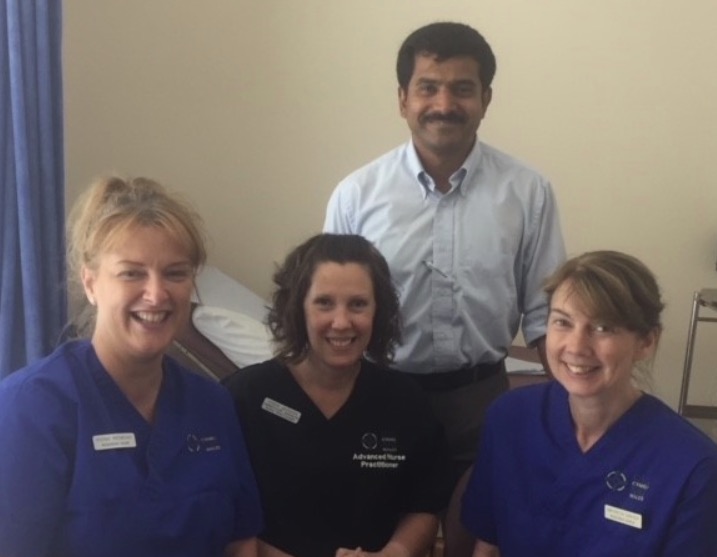North Wales cancer patient first in the world to trial new myeloma treatment

A North Wales cancer patient has become the first in the world to take part in a new trial looking for a more effective treatment for myeloma.
The study compares two different combinations of cancer medicines to see which helps control myeloma better in patients whose disease is no longer responding to treatment, or whose disease has reoccurred after two or more previous treatments.
This study is “investigational” because one of the treatment combinations – ixazomib plus dexamethasone – has not been approved for this use.
Myeloma is a type of bone marrow cancer affecting white blood cells known as plasma cells, which make antibodies to fight infections. Myeloma can be found where there is bone marrow, including the pelvis, spine and ribcage, and can occur in several different locations in the body.
Various treatments are available to reduce the levels and spread of the cancer throughout the body, as well as to relieve the symptoms and complications it causes.
Existing treatments work for some patients, however for some patients the cancer may continue to progress or patients may have a relapse.
The purpose of the study, sponsored by Takeda Pharmaceuticals International, is to learn if ixazomib plus dexamethasone controls multiple myeloma longer and improves survival compared to pomalidomide/dexamethasone which is an approved treatment.
This will be studied in patients whose disease is no longer responding to treatment or whose disease has reoccurred after two or more previous treatments.
The study is one of 225 clinical studies registered with Betsi Cadwaladr University Health Board’s Research and Development department.
Current studies including complex interventional clinical trials and studies conducted as part of academic study, and can take years to complete, depending on the study.
Over the last 12 months, more than 3,000 North Wales patients have taken part in research studies.

The study in Betsi Cadwaladr University Health Board is being overseen by Dr Earnest Heartin alongside a team of research nurses.
Dr Heartin said:
“We’ve been encouraged by the fact a patient from our area has become the first person to take part in this trial.
“We hope that there might be more people, perhaps in North Wales, who read about this and decide to take part as well.”
Lynne Grundy, Interim Director of Research and Development, said:
“Clinical research is a really important part of the Health Board’s work.
“Every year thousands of patients take part in studies which contribute to improving the way we care for a wide range of conditions and diseases, and we work really hard to provide the best facilities and opportunities for our staff to carry out ground-breaking research.”
The Betsi Cadwaladr University Health Board’s Research and Development department is funded by Health and Care Research Wales, which provides an infrastructure to support and increase capacity in research and development in Wales.
Professor Jon Bisson, director of Health and Care Research Wales, said:
“This is an important study that could lead to access to new cancer treatments for patients here in Wales and around the world. These are patients facing real uncertainty about their future, with very limited or no treatment options available to them.
“It is essential the NHS and the pharmaceutical industry work together on timely research like this to develop thoroughly tested and effective treatments, which could improve patient outcomes and survival rates.
“The team at Betsi Cadwaladr University Health Board is leading the way in recruiting the first participant to this global study. This demonstrates their commitment to delivering research at pace and it also showcases Wales as an internationally recognised place to carry out high quality research that makes a difference to people’s lives.”
Main Photograph: Stock Image
Spotted something? Got a story? Email: [email protected]
Latest News
